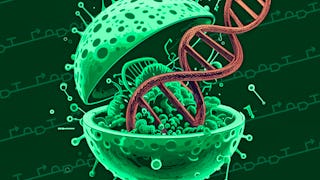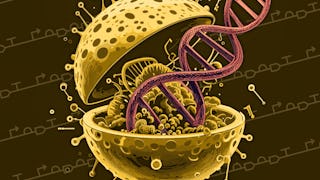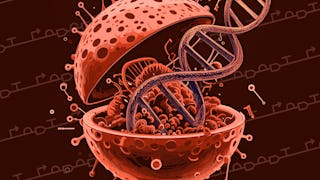This course gives an introduction to the biology and biochemistry necessary to understand genetic circuits. It starts by providing an engineering viewpoint on genetic circuit design and a review of cells and their structure. The second module introduces genetic parts and the importance of standards followed by a discussion of genetic devices used within circuit design. The last two modules cover experimental techniques and construction methods and principles applied during the design process.


Engineering Genetic Circuits: Design
This course is part of Engineering Genetic Circuits Specialization


Instructors: Chris Myers
4,173 already enrolled
Included with
(33 reviews)
Recommended experience
What you'll learn
Identify the different types of cells, their components, and structure.
Discover the underlying structure of devices and their connection to genetic parts.
Contrast different experimental techniques used in genetic construction.
Evaluate the different principles used in genetic circuit design.
Skills you'll gain
Details to know

Add to your LinkedIn profile
10 assignments
See how employees at top companies are mastering in-demand skills

Build your subject-matter expertise
- Learn new concepts from industry experts
- Gain a foundational understanding of a subject or tool
- Develop job-relevant skills with hands-on projects
- Earn a shareable career certificate

There are 5 modules in this course
This week gives a brief introduction to the biology and biochemistry necessary to understand genetic circuits. The material covered is only a basic overview, since it is usually the topic of whole courses. It should, however, give the grounding necessary to begin studying the modeling, analysis, and design of genetic circuits.
What's included
8 videos4 readings3 assignments
This week highlights the importance of standards in synthetic biology as an engineering discipline. Furthermore, the week introduces genetic parts - the basic building used to construct genetic circuits.
What's included
17 videos10 readings3 assignments
This week introduces genetic devices, the aggregation of multiple genetic parts. Basic rules for composing, as well as different types of devices, are introduced, as well.
What's included
11 videos2 readings2 assignments1 peer review
This week introduces techniques used to construct a genetic circuit. This includes commonly used methods like polymerase chain reaction for cloning and DNA assembly methods. Finally, construction methods to assemble different genetic parts are presented.
What's included
7 videos7 readings1 assignment1 peer review
This week introduces practical challenges in realizing genetic circuit designs.
What's included
5 videos2 readings1 assignment
Earn a career certificate
Add this credential to your LinkedIn profile, resume, or CV. Share it on social media and in your performance review.
Build toward a degree
This course is part of the following degree program(s) offered by University of Colorado Boulder. If you are admitted and enroll, your completed coursework may count toward your degree learning and your progress can transfer with you.¹
Instructors


Offered by
Explore more from Electrical Engineering
 Status: Free Trial
Status: Free TrialUniversity of Colorado Boulder
 Status: Free Trial
Status: Free TrialUniversity of Colorado Boulder
 Status: Free Trial
Status: Free TrialUniversity of Colorado Boulder
 Status: Preview
Status: Preview
Why people choose Coursera for their career




Learner reviews
33 reviews
- 5 stars
69.69%
- 4 stars
18.18%
- 3 stars
9.09%
- 2 stars
0%
- 1 star
3.03%
Showing 3 of 33
Reviewed on Sep 11, 2024
Good but the peer review process is so slow. The instructors need to fix this. There has been a backlog of assignments since last year.

Open new doors with Coursera Plus
Unlimited access to 10,000+ world-class courses, hands-on projects, and job-ready certificate programs - all included in your subscription
Advance your career with an online degree
Earn a degree from world-class universities - 100% online
Join over 3,400 global companies that choose Coursera for Business
Upskill your employees to excel in the digital economy
Frequently asked questions
To access the course materials, assignments and to earn a Certificate, you will need to purchase the Certificate experience when you enroll in a course. You can try a Free Trial instead, or apply for Financial Aid. The course may offer 'Full Course, No Certificate' instead. This option lets you see all course materials, submit required assessments, and get a final grade. This also means that you will not be able to purchase a Certificate experience.
When you enroll in the course, you get access to all of the courses in the Specialization, and you earn a certificate when you complete the work. Your electronic Certificate will be added to your Accomplishments page - from there, you can print your Certificate or add it to your LinkedIn profile.
Yes. In select learning programs, you can apply for financial aid or a scholarship if you can’t afford the enrollment fee. If fin aid or scholarship is available for your learning program selection, you’ll find a link to apply on the description page.
More questions
Financial aid available,

